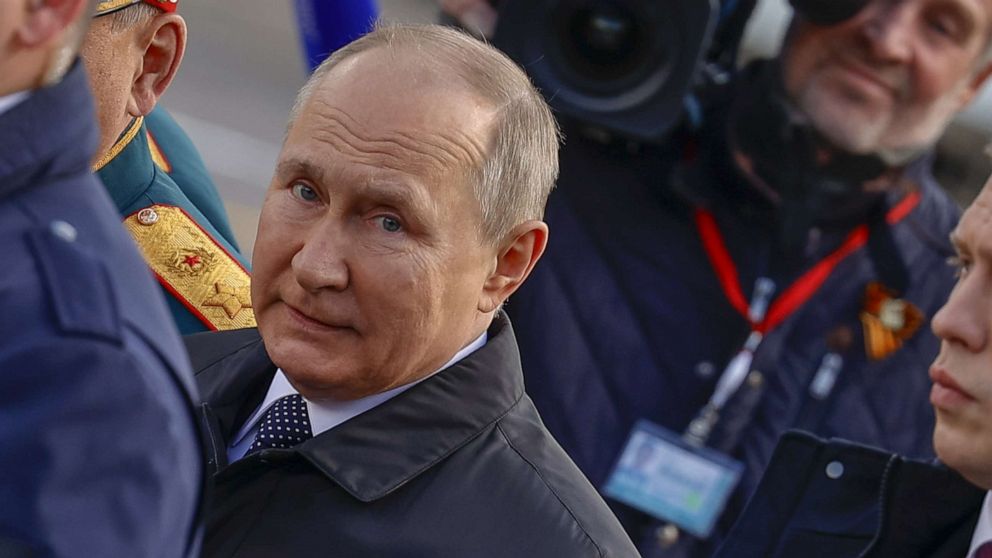俄罗斯国家情报总监艾薇儿·海恩斯(Avril Haines)表示,俄罗斯总统弗拉基米尔·普京正在为乌克兰的“长期冲突”做准备,如果战斗不以他的方式进行,他可能会采取严厉措施。
在周二的参议院军事委员会听证会上,海恩斯说普京入侵乌克兰对地缘政治秩序造成了冲击,“对未来的影响我们才刚刚开始理解,但肯定会产生重大影响。”
海因斯说,尽管普京在北部失败后将力量集中在顿巴斯,但美国认为他不会满足于该国东部。
“未来一两个月的战斗将会很重要,因为俄罗斯人试图重振旗鼓。但即使他们成功了,我们也没有信心顿巴斯的战斗会有效地结束战争,”她说。“我们评估,普京总统正在为乌克兰的长期冲突做准备,在此期间,他仍打算实现顿巴斯以外的目标。”
但就目前而言,普京的目标是控制顿巴斯的顿涅茨克州和卢甘斯克州,并从南北两面包围乌克兰军队,“以便粉碎那些为守住东部防线而战的最有能力、装备精良的乌克兰军队,”海因斯说。
她说,普京还希望“巩固俄罗斯已经建立的从克里米亚到顿巴斯的大陆桥的控制,占领赫尔松,并控制克里米亚的水源”。
根据海因斯的说法,美国也看到了他的军队希望将大陆桥延伸到摩尔多瓦的德涅斯特河左岸地区的迹象。
海恩斯表示,俄罗斯可能有能力在未来几个月实现“大部分”目标,但需要动员更多的军队来实现最后一个目标:
“我们认为,如果不进行某种形式的动员,他们将无法控制一座延伸至德涅斯特河左岸地区、包括敖德萨在内的大陆桥。在未来几周,他们越来越不可能控制两个州和他们想要的缓冲区。

阿纳多卢图片社
俄罗斯总统弗拉基米尔·普京出席纪念苏联解体77周年阅兵式.
但她补充说,普京“可能指望美国和欧盟的决心会随着食品短缺、通货膨胀和能源价格的恶化而减弱”。
海恩斯表示,经济力量也在俄罗斯发挥作用,西方的制裁对俄罗斯产生了“相当重大”的影响。
“举例来说,我们可以考虑的指标包括...我们预测俄罗斯的通货膨胀率约为20%,我们预计他们的国内生产总值将在今年下降约10%,甚至可能更多。
战斗本身也削弱了俄罗斯的能力。
“我们的观点是,地面作战力量已经被大大削弱。这将花费他们数年的时间...来重建它,”她说。
但退化的常规力量可能会驱使普京采取其他方式施加力量。
“这最终可能意味着,在此期间,他们实际上更加依赖不对称工具,”海恩斯说。“所以他们可能更依赖于网络、核、精确等东西。这显然是他们努力施加影响的方式的转变。”
海因斯说,普京的远大抱负和他退化的常规能力之间的差异可能导致“一个更加不可预测和潜在升级的轨迹”,以及未来几个月“俄罗斯的一个更加临时的决策时期”。
这也可能在国内表现出来。
“目前的趋势增加了普京总统转向更激烈手段的可能性,包括实施戒严令,调整工业生产,或者随着冲突的持续,或者如果他认为俄罗斯正在乌克兰失败,可能会采取升级的军事行动,以释放实现其目标所需的资源,”她说。
接下来会发生什么?
“未来几周,冲突升级最有可能的爆发点是俄罗斯越来越多地试图阻止西方的安全援助、报复西方的经济制裁或威胁国内政权。我们认为,莫斯科继续使用核言论来阻止美国和西方增加对乌克兰的致命援助,并回应美国和北约盟国的公开评论,这些评论表明西方在这场冲突中的目标有所扩大,”她说。
普京的下一步可能是启动大型核演习,以赢得美国的尊重。
海恩斯说:“如果普京认为美国无视他的威胁,他可能会试图向华盛顿发出信号,通过授权进行另一次大规模核演习,包括大规模分散机动洲际导弹、重型轰炸机和战略潜艇,来加剧美国支持乌克兰的危险。”
但到目前为止,美国官员表示,他们不认为俄罗斯准备在乌克兰或其他地方实际使用核武器。
海恩斯说:“我们仍然认为,普京总统可能只会在他认为俄罗斯国家或政权面临生存威胁的情况下,才会授权使用核武器。”。
Putin prepping 'prolonged conflict' beyond Donbas, could escalate nuclear threats: Top US intel official
Russian President Vladimir Putin is preparing for a "prolonged conflict" in Ukraine, and could resort to drastic measures if the fighting doesn't go his way, according to Director of National Intelligence Avril Haines.
During a Senate Armed Services Committee hearing Tuesday, Haines saidPutin's invasion of Ukrainehas sent a shock through the geopolitical order, "with implications for the future that we are only beginning to understand, but are sure to be consequential."
Though Putin has focused his forces on Donbas after failing in the north, the U.S. does not believe he will be content with the eastern part of the country, Haines said.
"The next month or two of fighting will be significant as the Russians attempt to reinvigorate their efforts. But even if they are successful, we are not confident that the fight in the Donbas will effectively end the war," she said. "We assess President Putin is preparing for prolonged conflict in Ukraine during which he still intends to achieve goals beyond the Donbas."
But for now Putin's goal is to take control of the Donetsk and Luhansk oblasts in Donbas and encircle Ukrainian forces from the north and south "in order to crush the most capable and well-equipped Ukrainian forces who are fighting to hold the line in the East," Haines said.
Putin would also like to "consolidate control of the land bridge Russia has established from Crimea to the Donbas, occupy Kherson, and control the water source for Crimea," she said.
The U.S. also sees signs his military wants to extend that land bridge to Transnistria, in Moldova, according to Haines.
Haines said Russia might be capable of achieving "most" of those goals in the coming months, but would need to mobilize more troops to achieve the last:
"We believe that they will not be able to extend control over a land bridge that stretches to Transnistria and includes Odessa without launching some form of mobilization. And it is increasingly unlikely that they will be able to establish control over both oblasts and the buffer zone they desire in the coming weeks," Haines said.
But Putin is "probably counting on U.S. and EU resolve to weaken as food shortages, inflation, energy prices get worse," she added.
Economic forces are at work in Russia as well, with sanctions from the West having a "pretty significant" impact on Russia, according to Haines.
"Among the indicators that one might look at are, for example, the fact that ... we predict approximately 20% inflation in Russia, that we expect that their GDP will fall about 10%, possibly even more, over the course of the year," she said.
The fighting itself has also worn on Russia's capabilities.
"Our view is that the ground combat forces have been degraded considerably. It's going to take them years ... to rebuild that," she said.
But degraded conventual forces could drive Putin to other means of exerting force.
"That may end up meaning that they have greater reliance in effect on asymmetric tools during this period," Haines said. "So they may rely more on things like cyber, nuclear, precision, etc. And that's obviously a shift in the way in which they are exercising their efforts for influence."
The discrepancy between Putin's high aspirations and his degraded conventional capability could lead to "a more unpredictable and potentially escalatory trajectory," and "a period of more ad-hoc decision making in Russia" in the next few months, Haines said.
This could also manifest itself domestically.
"The current trend increases the likelihood that President Putin will turn to more drastic means, including imposing martial law, reorienting industrial production, or potentially escalatory military actions to free up the resources needed to achieve his objectives as the conflict drags on, or if he perceives Russia is losing in Ukraine," she said.
What could happen next?
"The most likely flashpoints for escalation in the coming weeks are around increasing Russian attempts to interdict Western security assistance, retaliation for Western economic sanctions or threats to the regime at home. We believe that Moscow continues to use nuclear rhetoric to deter the United States and the West from increasing lethal aid to Ukraine and to respond to public comments of the U.S. and NATO allies that suggest expanded Western goals in the conflict," she said.
The next step for Putin could be to launch major nuclear drills to command respect from the U.S.
"If Putin perceives that the United States is ignoring his threats, he may try to signal to Washington the heightened danger of its support to Ukraine by authorizing another large nuclear exercise involving a major dispersal of mobile intercontinental missiles, heavy bombers, strategic submarines," Haines said.
But so far U.S. officials have said they do not believe Russia is preparing to actually use nuclear weapons in Ukraine or elsewhere.
"We otherwise continue to believe that President Putin would probably only authorize the use of nuclear weapons if he perceived an existential threat to the Russian state or regime," Haines said.






